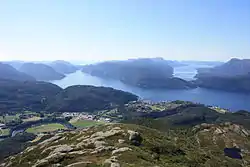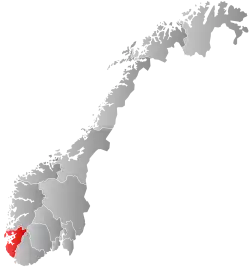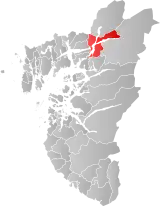Sand Municipality
Sand herred | |
|---|---|
 View of the village and municipality of Sand | |
 Rogaland within Norway | |
 Sand within Rogaland | |
| Coordinates: 59°29′12″N 06°15′04″E / 59.48667°N 6.25111°E | |
| Country | Norway |
| County | Rogaland |
| District | Ryfylke |
| Established | 1 Jan 1859 |
| • Preceded by | Jelsa Municipality |
| Disestablished | 1 Jan 1965 |
| • Succeeded by | Suldal Municipality |
| Administrative centre | Sand |
| Area (upon dissolution) | |
| • Total | 221 km2 (85 sq mi) |
| Population (1965) | |
| • Total | 1,135 |
| • Density | 5.1/km2 (13/sq mi) |
| Demonym | Sandsbu[1] |
| Time zone | UTC+01:00 (CET) |
| • Summer (DST) | UTC+02:00 (CEST) |
| ISO 3166 code | NO-1136[2] |
Sand is a former municipality in Rogaland county, Norway. The 221-square-kilometre (85 sq mi) municipality encompassed the area around the Hylsfjorden and the inner part of the Sandsfjorden in the present-day Suldal Municipality. The administrative centre of the municipality was the village of Sand where Sand Church is located.[3]
History
The municipality was created in 1859 when the municipality of Jelsa was split in two. Initially, Sand had 1,600 inhabitants. On 1 January 1965, the municipality of Sand was dissolved due to the recommendations of the Schei Committee. Sand was incorporated into the neighboring municipality of Suldal along with Erfjord and parts of Imsland and Jelsa municipalities. Prior to the merger, Sand had 1,135 inhabitants.[4]
Name
The municipality (originally the parish) is named after the old Sand farm (Old Norse: Sandr) since the first Sand Church was built there. The name is identical to the word sandr which means "sand".[5]
Government
While it existed, this municipality was responsible for primary education (through 10th grade), outpatient health services, senior citizen services, unemployment, social services, zoning, economic development, and municipal roads. During its existence, this municipality was governed by a municipal council of directly elected representatives. The mayor was indirectly elected by a vote of the municipal council.[6]
Municipal council
The municipal council (Herredsstyre) of Sand was made up of 13 representatives that were elected to four year terms. The party breakdown of the final municipal council was as follows:
| Party name (in Norwegian) | Number of representatives | |
|---|---|---|
| Labour Party (Arbeiderpartiet) | 4 | |
| Local List(s) (Lokale lister) | 9 | |
| Total number of members: | 13 | |
| Party name (in Norwegian) | Number of representatives | |
|---|---|---|
| Labour Party (Arbeiderpartiet) | 4 | |
| Joint List(s) of Non-Socialist Parties (Borgerlige Felleslister) | 1 | |
| Local List(s) (Lokale lister) | 8 | |
| Total number of members: | 13 | |
| Party name (in Norwegian) | Number of representatives | |
|---|---|---|
| Labour Party (Arbeiderpartiet) | 4 | |
| Local List(s) (Lokale lister) | 9 | |
| Total number of members: | 13 | |
| Party name (in Norwegian) | Number of representatives | |
|---|---|---|
| Labour Party (Arbeiderpartiet) | 4 | |
| Local List(s) (Lokale lister) | 8 | |
| Total number of members: | 12 | |
| Party name (in Norwegian) | Number of representatives | |
|---|---|---|
| Labour Party (Arbeiderpartiet) | 3 | |
| Local List(s) (Lokale lister) | 9 | |
| Total number of members: | 12 | |
| Party name (in Norwegian) | Number of representatives | |
|---|---|---|
| Labour Party (Arbeiderpartiet) | 4 | |
| Local List(s) (Lokale lister) | 8 | |
| Total number of members: | 12 | |
| Party name (in Norwegian) | Number of representatives | |
|---|---|---|
| Labour Party (Arbeiderpartiet) | 2 | |
| Farmers' Party (Bondepartiet) | 2 | |
| Local List(s) (Lokale lister) | 8 | |
| Total number of members: | 12 | |
| Note: Due to the German occupation of Norway during World War II, no elections were held for new municipal councils until after the war ended in 1945. | ||
See also
References
- ↑ "Navn på steder og personer: Innbyggjarnamn" (in Norwegian). Språkrådet.
- ↑ Bolstad, Erik; Thorsnæs, Geir, eds. (26 January 2023). "Kommunenummer". Store norske leksikon (in Norwegian). Kunnskapsforlaget.
- ↑ Store norske leksikon. "Sand – sogn" (in Norwegian). Retrieved 20 May 2015.
- ↑ Jukvam, Dag (1999). Historisk oversikt over endringer i kommune- og fylkesinndelingen (PDF) (in Norwegian). Statistisk sentralbyrå. ISBN 9788253746845.
- ↑ Rygh, Oluf (1915). Norske gaardnavne: Stavanger amt (in Norwegian) (10 ed.). Kristiania, Norge: W. C. Fabritius & sønners bogtrikkeri. p. 352.
- ↑ Hansen, Tore; Vabo, Signy Irene, eds. (20 September 2022). "kommunestyre". Store norske leksikon (in Norwegian). Kunnskapsforlaget. Retrieved 1 January 2023.
- ↑ "Kommunevalgene 1963" (PDF) (in Norwegian). Oslo: Statistisk sentralbyrå. 1964. Retrieved 30 July 2020.
- ↑ "Kommunevalgene og Ordførervalgene 1959" (PDF) (in Norwegian). Oslo: Statistisk sentralbyrå. 1960. Retrieved 30 July 2020.
- ↑ "Kommunevalgene og Ordførervalgene 1955" (PDF) (in Norwegian). Oslo: Statistisk sentralbyrå. 1957. Retrieved 30 July 2020.
- ↑ "Kommunevalgene og Ordførervalgene 1951" (PDF) (in Norwegian). Oslo: Statistisk sentralbyrå. 1952. Retrieved 30 July 2020.
- ↑ "Kommunevalgene og Ordførervalgene 1947" (PDF) (in Norwegian). Oslo: Statistisk sentralbyrå. 1948. Retrieved 30 July 2020.
- ↑ "Kommunevalgene og Ordførervalgene 1945" (PDF) (in Norwegian). Oslo: Statistisk sentralbyrå. 1947. Retrieved 30 July 2020.
- ↑ "Kommunevalgene og Ordførervalgene 1937" (PDF) (in Norwegian). Oslo: Statistisk sentralbyrå. 1938. Retrieved 30 July 2020.
